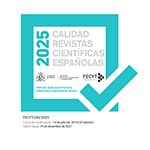Política de buenas prácticas en cuestiones de género
Esta revista está comprometida con promover la igualdad entre hombres y mujeres, en dar visibilidad al trabajo científico de las mujeres, y en promover el uso del lenguaje inclusivo en las publicaciones científicas.
Concretamente mediante las siguientes acciones:
- Mantenimiento de un equilibrio en el porcentaje de mujeres y hombres que componen los órganos de Dirección, Secretaría de Redacción, Consejo de Redacción y Consejo Asesor.
- Cumplimiento de un porcentaje mínimo del 40% de mujeres como revisoras de los trabajos enviados a la revista
- En lo que atañe a lenguaje inclusivo, la revista Didáctica. Lengua y Literatura se adhiere al objetivo de las Naciones Unidas de “expresarse oralmente y por escrito sin discriminar a un sexo, género social o identidad de género en particular” (https://www.un.org/es/gender-inclusive-language/index.shtml). Dicha aspiración ha de resultar compatible con las orientaciones en materia lingüística formuladas por la Real Academia Española de la Lengua en su Informe sobre el lenguaje inclusivo y cuestiones conexas, de 16 de enero de 2020 (https://www.rae.es/sites/default/files/Informe_lenguaje_inclusivo.pdf). De esta manera, los artículos no contendrán supuestos sobre las creencias o las adhesiones de los lectores/as, evitarán toda afirmación de superioridad relativa a raza, sexo, cultura o cualquier otra característica. Asimismo, en ellos se utilizará un lenguaje libre de sesgos, usando términos que huyan de los estereotipos.
- Requiere que se informe sobre si los datos de origen de la investigación tienen en cuenta el sexo, con el fin de permitir la identificación de posibles diferencias.
- Inclusión en la revista del nombre completo de los/as autores/as de los trabajos que publica.










